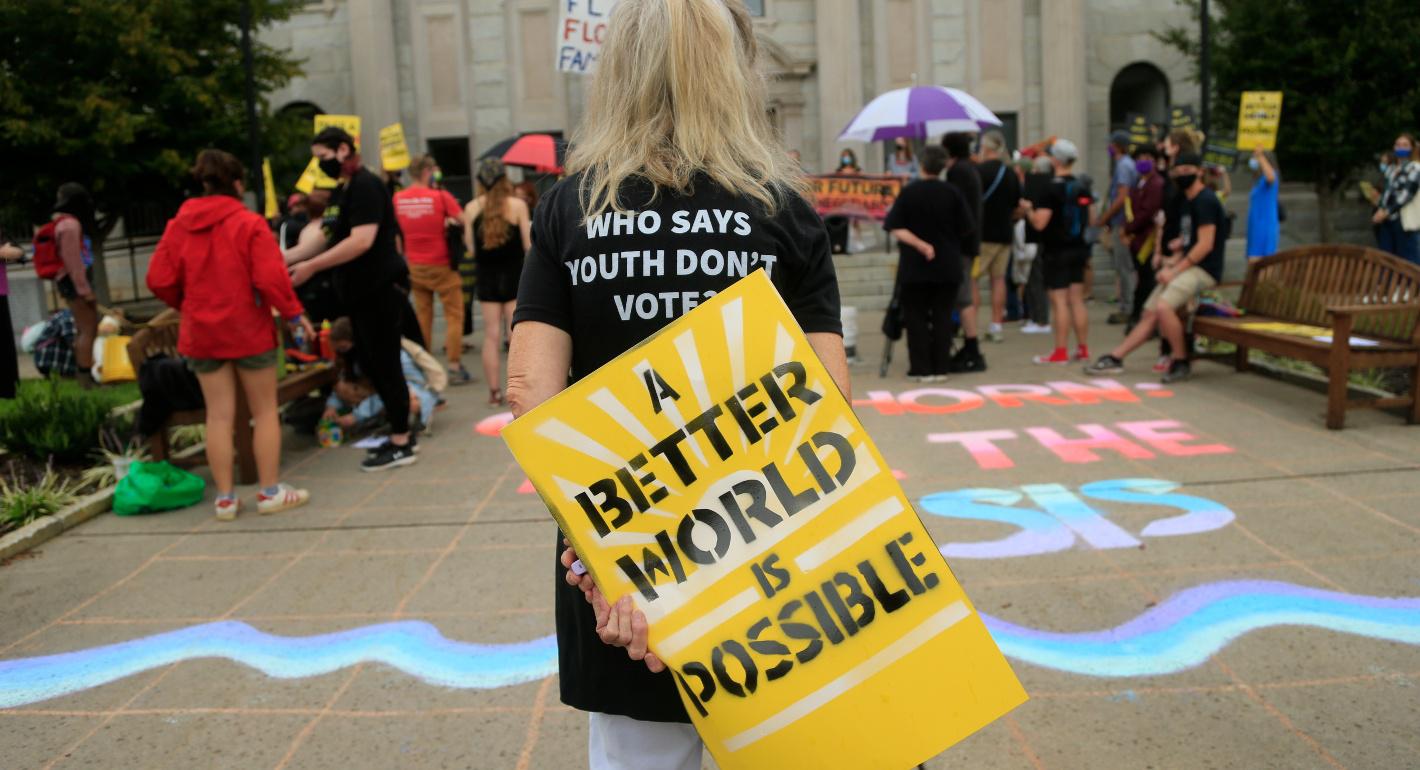A debate has raged for years over whether democratic or autocratic regimes are better able to tackle climate change. But the link runs both ways: as politics affect climate policy, climate policies are in turn reshaping politics. As arguments sharpen over which kind of political system can best spur climate action, the imperatives of curbing or at least slowing the planet’s ecological crises will induce political change. The postindustrial democracies of Europe factor prominently in these deliberations.
Several ways of dealing with climate change are emerging in European democracies. These include new expert agencies, legally enshrined climate commitments, citizen assemblies, and protest movements. These changes are prompting more ambitious climate action, but their political implications vary and sometimes tensions among them emerge. As significant as the changes are, they fall short of what is required to foster what might be termed green democracy. Further steps are needed to rectify this.
The Perils of Depoliticizing Climate Policy
The climate debate has spawned concerns that the vast scope of the challenge may tempt democracies to behave more autocratically, or at least less democratically. So-called eco-authoritarianism continues to have its supporters. Some iconic environmentalists have called for democracy to be put on hold so governments can take unpopular actions to address ecological challenges. Some analysts still doubt that democracy is the political system most capable of implementing effective policies to curb climate change. In general, however, the debate has turned in a broadly prodemocratic direction of late and has increasingly focused on the benefits of having citizens weigh in on how the putative ecological transition will play out.
Recent data seem to show that democracies make “more ambitious” commitments to reduce carbon emissions than nondemocracies do. Little evidence suggests that autocratic regimes have been more apt to implement far-reaching, long-term climate action: these regimes may not face open elections, but their leaders do need to be mindful of short-term popular concerns to keep themselves in power. There are signs that voters concur: one recent survey shows that 79 percent of French citizens believe that democracy is the best form of government for “preserv[ing] the environment.” Europeans routinely say that more (not less) democracy is needed during the transition to a low-carbon economy.
Still, the case in favor of democracy is not watertight. It is neither easy nor straightforward to control for other potentially relevant factors: it is not clear, for instance, whether advanced Western economies have the most ambitious climate commitments because they are democratic or because they are wealthy and more postindustrial than other societies. Furthermore, wealthy democracies also outsource a lot of their dirty energy consumption by importing high-polluting goods from other countries; when this practice is taken into account, democracies appear to be no more beneficial to the environment than autocracies, according to Varieties of Democracy.
In any case, quantitative studies can take discussions only so far. The democracy-versus- autocracy framing of these debates is not wholly satisfactory. It is somewhat of a diversion, as both kinds of political systems have failed to implement sufficiently ambitious climate change policies. Even if the data show democracies have formulated more ambitious climate commitments than autocracies, this does not necessarily mean that democracies are adequately tackling ecological challenges. There are simply too few examples of governments of any regime type making far-reaching progress on the ecological transition.
Moreover, there are so many factors that determine a country’s regime type that the question of whether democracy or autocracy is better at addressing climate change is somewhat abstract. Even if the empirical evidence showed strong advances on climate policy by authoritarian regimes, that alone would be unlikely to push democracies to embark on a full-scale transition to autocracy, as there are so many other reasons why citizens prefer democracy.
Still, this debate is pertinent because it does lead more indirectly into the first level of change afoot in European democracies. The most practical issue at hand is not so much about the democracy-autocracy binary but about democracies starting to close off climate-related decisions from open democratic debate. This concern is a real possibility and is already happening in several ways. The risk stems not from outright autocracy but from a more managed form of democracy. Some commentators argue that expert democracy or guided democracy is needed to design and implement an effective ecological transition. Many climate activists increasingly prefer this kind of more controlled decisionmaking. Support remains strong for the long-standing call for “planetary stewardship”—the notion that enlightened experts are best equipped to oversee crucial processes of ecological transition and societal adaptation.
This kind of depoliticization may become increasingly relevant to the politics of climate change in the sense of more and more environmental issues being insulated from competitive day-to-day politics. This tendency is increasingly apparent in multiple aspects of many European governments’ approaches to climate change. Most European governments have enshrined climate-related commitments in constitutional provisions or enacted carbon targets in climate laws. In several countries—such as Germany and the Netherlands, for instance—courts have ruled that governments’ climate plans are not commensurate with these constitutional promises. Most European governments have also set up independent technical agencies and legislative committees to monitor and oversee these climate commitments. In addition, the increasingly frequent practice of governments or local authorities declaring climate emergencies has a ring of permitting exceptional measures that abridge normal democratic rights.
This same ethos is set to extend further, the logic being that climate action is so urgent and necessary that such commitments supersede everyday politics. More second-order forms of depoliticization are also becoming apparent: important developments in climate policies, especially at the EU level, are being crafted without accompanying democratic accountability. The EU has decided with little citizen input or monitoring that governments must spend at least 30 percent of their receipts from its new pandemic-related stimulus package, the Recovery and Resilience Facility (RRF), on green projects. Similarly, the EU will start to rake in revenues from an enhanced Emissions Trading System and its new Carbon Border Adjustment Mechanism without any debate about democratic oversight of these funds.
Such moves are by no means undemocratic; governments with democratic legitimacy promote them, and opposition parties often support them too. Still, depoliticization raises tricky questions about the extent of democratic accountability. Climate laws are a significant advance, and the increasing number of legally enshrined commitments somewhat protect the climate agenda from populists and nefarious vested interests. But these steps narrow the boundaries of democratic pluralism. They give an impression that climate action is a matter of ensuring that objectively correct measures are implemented and accelerated, as if such measures were technocratic imperatives beyond the cut and thrust of ordinary politics.
Top-down, expert-led initiatives like the UN Intergovernmental Panel on Climate Change, the UN Framework Convention on Climate Change and the Conference of Parties, and the Paris Agreement have in practice fallen short. They appear to drive not comprehensive solutions but rather changes that work within current systems—namely technological fixes without the necessary systemic changes to social and political organization. Many of the recently created European climate agencies and committees have been hampered in their work by political disputes. Sobering lessons might be drawn from the analogous depoliticization of some aspects of economic and monetary policies, as many voters have clearly grown frustrated with the way these policies have been removed from the political arena.
Depoliticizing climate policy might prompt progress toward emissions targets and some elements of the ecological transition. But there might be corresponding costs to such moves in terms of diminished democratic legitimacy. The lesson from other depoliticized policy areas is this: when all major mainstream parties collude in agreement that a certain issue is so important it needs to be insulated from risky and contrarian political agendas, voters can easily turn to more radical, populist political movements as their only way of registering discontent.
Competing Forms of Citizen Engagement on Climate Change
Alongside this turn to expert-led democracy, more participative forms of democratic engagement have also gained momentum. Both institutionalized, small-scale deliberations and large-scale civic mobilization have spread. Each brings essential elements (and some concerns) to the European quest for green democracy.
The Gains and Limits of Climate Assemblies
The spread of climate assemblies has been the most concrete and positive trend in aligning climate action and democratic participation. This enormously valuable development has attracted most of the attention in debates about reshaping politics around the climate transition. The increasingly mainstream view is that consulting citizens can help spur effective steps to curb climate change. In the last several years, climate assemblies have multiplied across Europe. Notable examples include those in Austria, Denmark, France, Ireland, and the UK (including Scotland). Assemblies are also being planned in Spain and potentially the Netherlands. Several of them have pushed their governments to make new climate commitments.
Despite the impressive progress of such assemblies and the high-quality deliberations they have fostered, these participative initiatives are not without flaws. They have largely asked citizens for a menu of options to achieve policy goals already predetermined by governments. In this sense, climate assemblies have dealt with low-hanging fruit, essentially facilitating agreement on things to which almost all citizens can acquiesce without game-changing consequences to their lives. Participants tend to call for measures likely to offer general societal benefits like investments in energy efficiency, recycling, and public transport; more localized food production; and incentives for purchasing electric cars and adding more recharging stations. While these are all extremely valuable topics, by focusing on them too squarely, climate assemblies tend to overlook more controversial and far-reaching aspects of change.
In this way, assemblies sometimes risk giving the impression that achieving preordained climate targets is a question of broadly beneficial and objectively good climate measures. These deliberative exercises can unwittingly give legitimacy to governments that are committed to only partial ecological transitions, thus making full-spectrum change less likely. Such systemic reform will unavoidably involve far-reaching redistributive costs. Overall figures about climate change’s impact on GDP say little about these broader concerns, as the thorniest political issue will be more about the distribution of these costs and new opportunities than about aggregate effects.
Climate assemblies have not yet come close to grappling with these issues. Supporters insist that assemblies have made proposals relevant to the redistributive costs of climate change—like higher taxes on carbon—and that ordinary citizens will support radical changes if they have the issues explained to them and if they are obliged to make proposals themselves. Even if this optimistic assumption is warranted, however, the structures of these small-scale forums for public deliberation do not fully address how democracies will decide on the redistributive costs of a full ecological transition.
Forging a consensus on more sensitive measures will be much harder than reaching agreement on uncontroversial calls for, say, local bicycle paths. This is especially true when more controversial measures will be needed to enact wholesale changes to prevailing economic models but also will close down whole sectors of economic activity and greatly affect many citizens’ lifestyles. These questions will have to be battled out in adversarial debates between winners and losers rather than smoothed over with modest steps that add general value to society as a whole. On such deep structural issues, European societies are far from achieving harmonious agreement and are not uniformly prepared for radical reforms.
Most European citizens say they want stronger environmental policies in general, but their levels of support for such policies plummet when they are asked about measures that would have concrete effects on their own daily lives. Once steps like carbon pricing are extended in ambitious directions, they will hit poor communities disproportionately hard. Divisions on those questions cut across existing ideological, social, geographic, and other divides: the democratic politics of a full ecological transition will be difficult and turbulent. It is not evident how such open-ended questions can be posed and dealt with in tightly structured assemblies. Policy documents are replete with generic calls for a “fair transition,” yet there is no EU plan for a participative political process capable of arbitrating what this means. Signs of such discord already have been evident in the political conflicts across Europe in 2021 over rising electricity bills—that are in part the result of rises in carbon prices beginning to bite.
Supporters say climate assemblies bring in a range of viewpoints and encourage compromise, but the most pertinent issue is who will be formally empowered to make decisions that will affect members of society so differently. It would be unfair to expect climate assemblies to resolve such deep-rooted power asymmetries and confrontations or to fashion wholesale plans for the ecological transition. These forums are not equipped to do this; so far, they have yet to even accomplish the more modest task of bypassing parliamentarians’ reluctance to accept costly changes affecting their constituents. Climate assemblies generally work within conservative, state-determined parameters and may fail to gain wider popular support if and when they do propose ambitious changes—they can appear both too timid and too radical in this sense.
Finding a Role for Climate Protests
Unsurprisingly given these limitations, more contentious democratic dynamics are on the rise too. Outside formalized climate assemblies, a wider range of opinions have been mobilized through far messier and unstructured mass protests. Such demonstrations are another arena of democratic engagement that the climate agenda has clearly galvanized in the last several years. Despite the vibrancy of these protests, they have received far less positive attention than climate assemblies as an integral part of ecologically attuned democracies.
Some political leaders have painted this activism largely as a problematic strand of democratic engagement over climate action. Most European governments have increased police powers to circumscribe protests in general, and this affects those related to environmental concerns. While engaging with the French climate assembly, President Emmanuel Macron has largely ignored multiple mass protests related to climate change and other ecological issues.
There are multiple other examples too. Civil society organizations and citizen groups are mobilizing against the environmental impact of mining projects for critical minerals in Europe, just as the EU is funding these very mining initiatives through the RRF. Many protest groups focused on radical redistributive proposals and social justice concerns have criticized current policies on climate change associated with the European Green Deal for regressively placing higher costs on poorer sectors of society; these groups often link such critiques to a call for radical democratic renewal. They have made little progress, and this more contentious strand of democratic mobilization has gained far less traction among decisionmakers than expert-led and deliberative democratic channels have.
Other protesters more openly question governments’ climate laws and the lack of consultation over such decisions. Some conservative-leaning libertarians are arguing with increasing resonance that climate policies are restricting democratic freedoms. They insist that democratic systems are not open or participative enough for citizens to challenge elite views on climate policy. In effect, they are turning the language of democratic rights against ambitious climate policy. Many of these citizens are concerned mainly about the lack of transparency and risks of government corruption: they feel hostility toward climate policies due to these political concerns more so than they display a priori hostility to climate action. Whether these appeals are sincere or opportunistic, they are having a complex impact on the relationship between climate action and democracy. Their rising prominence arguably suggests a need to improve democratic practices generally before authorities focus on more climate assemblies.
Steps Toward Green Democracy
In sum, Europeans are acting to address climate change through an uneasy combination of depoliticized democracy, climate assemblies, and protest movements. Each of these elements have different advantages and limitations for propelling adequate climate action. These developments and the tensions between them are remolding democracy. Together, they have made important contributions to advancing climate-related goals, but none of them can accomplish the task on their own.
Two prevailing views are equally questionable. One is that the climate agenda can be managed with a few modest tweaks to democratic politics. The other is that the task is so unmanageable using current democratic practices that open politics need to be curtailed. But regime type is not (yet) the main variable explaining worldwide differences in governments’ actions to tackle climate change. The more nuanced debate is about what kinds of adjustments existing political systems will undergo as the climate agenda pulls them in different directions.
Several guiding principles might help democracies become more fully attuned to the imperatives of the ecological transition. These tenets all speak to the need to connect and where possible harmonize different forms of democratic engagement over climate action.
- Root climate expertise in popular support. Expert-led deliberations on climate change need to be better legitimized with ordinary citizens. It is important to involve citizens in setting policy agendas, rather than forestalling such participation. If climate goals are to be enshrined in commitments that are immune to the push and pull of everyday politics, there have to be indicators to ensure such depoliticization is rooted in prior democratic consensus building. The aim should be to dovetail the best features of expert-led democracy with the best of participatory democracy.
- Foster localized conceptions of citizenship. During the ecological transition, many limits will be placed on individuals. States will no longer provide cheap, easy energy as the foundation of economic growth in the same way they do today: whole relationships between societies and states will change. Such shifts will likely fuel localism and possibly fragment national communities. Social contracts for the ecological transition must emerge from a new kind of locally minded citizenship. All kinds of democratic engagement must align with and contribute to this end.
- Harness the power of mass engagement productively. Protests may often be unpredictable and difficult to channel into constructive action, but mass engagement with ordinary citizens is needed as a complement to small-scale assemblies of randomly selected participants. Additional positive and concrete ways must be found to engage with everyday people at scale. Despite the antipathy of some governments, this will be a vital and inevitable part of fully green democracy.
- Balance the climate movement’s localism and transnationalism. There is a difficult balance to be struck between ecologically equipped democracy rooted in more localism and more transnationalism. Local assemblies, protests, and community-oriented civic organizations are all necessary, but the focus on these innovations of late has diverted attention from a key reality: no single democracy can pilot the ecological transition alone. This sentiment has been repeated ad infinitum over many decades, and yet few of the most significant democratic innovations related to climate action are transnational. Indeed, policy attention has shifted notably toward localized community initiatives. Beyond the few bold efforts to create global panels that exist today, governments and activists need to prioritize innovations that link together local initiatives beyond national borders.
- Couch climate action in full-fledged democratic renewal. Taken together, these tenets can help European democracies pursue full-spectrum democratic renewal. So far, policymakers, analysts, and activists have tended to ask how democracy can best be harnessed for climate action. But the reverse is also important: ensuring that concerns over climate change and other ecological crises help prompt higher-quality democracy, as an end in itself. The data shows that climate action is more ambitious not where more assemblies are held but where overall levels of democracy are stronger.
Current approaches to climate change are failing to take this wider democratic imperative into account. Select parts of the ecological challenge are being cordoned off from the political arena, with some being entrusted to technocratic agencies or legally enshrined in constitutional commitments while others are being ensconced in small-scale forums for public deliberation. These steps may be well-grounded, but they are not helping develop a complete range of democratic channels to address this pressing challenge.
Rather than pitting different kinds of democratic engagement against one another, countries need a more comprehensive conception of democracy to deal with the ecological transition for the long haul. Reshaping democracy by fixing these limitations to current approaches for achieving a greener future is the crucial task ahead.
Carnegie Europe is grateful to the Open Society Foundations for their support for this work.









